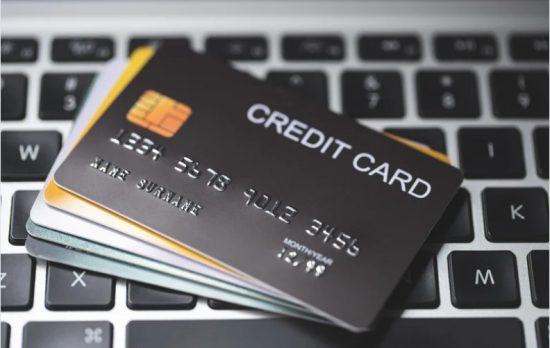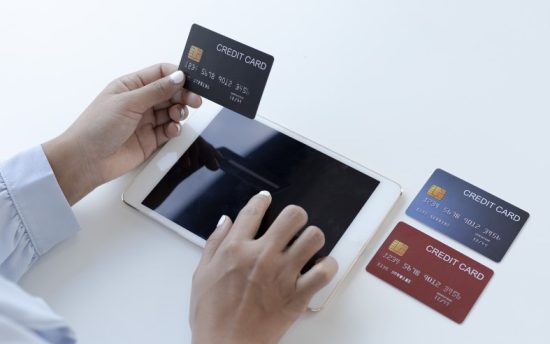Whether it’s for building credit, managing expenses, or earning rewards, a credit card can be a valuable tool in your financial arsenal. However, navigating the application process and finding the right card for you can seem daunting. Fear not! In this blog post, we’ll guide you through everything you need to know about how to get a credit card. From essential things to consider before applying to tips and strategies for increasing your chances of approval – we’ve got you covered! So sit back, relax and let’s dive into the world of credit cards.
What is a Credit Card?

A credit card is a plastic card that allows the cardholder to borrow money from a financial institution to make purchases. It works like a loan, which needs to be repaid within an agreed-upon period with or without interest.
Credit cards are convenient because they allow users to buy goods and services without carrying cash. They also offer benefits such as reward points, cashback offers, discounts on various products or services, and other perks.
The Benefits of Having a Credit Card
Credit cards have become a necessity in today’s fast-paced world and offer several benefits to their users.
- The convenience of using a credit card is one of its main benefits. It eliminates the need for cash, making it easier to make purchases anywhere anytime.
- Moreover, some credit cards come with rewards programs that offer cash back, points and miles on every purchase made using them. These rewards can add up over time, save money on future purchases, or help you fund your next vacation.
- Another benefit of having a credit card is building a credit history. Your payment activity will be reported to the major credit bureaus, which can help establish and improve your credit score over time if used responsibly.
- Credit cards also provide additional security measures compared to debit cards as they typically come with fraud protection that covers unauthorized transactions. Additionally, many companies offer extended warranties on items purchased through their credit card program.
- Owning a credit card offers numerous benefits such as convenience, reward programs, and building good credits history while providing added security features for peace of mind when making purchases online or in-store
Essential Things to Know Before Applying for a Credit Card
Before diving into the credit card application process, there are a few essential things to consider.
- First, you must understand your financial situation and credit score. Knowing your credit score can help you determine which type of credit card is best suited for you.
- Next, it’s important to research different types of credit cards and their respective benefits. Some offer rewards programs or cashback opportunities, while others have lower interest rates or annual fees.
- Additionally, be aware of any potential fees associated with using a credit card, such as late payment fees or balance transfer fees. It’s crucial to read the fine print before applying for any credit card.
- Another factor to keep in mind is your spending habits. If you tend to carry a balance on your credit cards each month, then finding a low-interest rate should be a priority.
- Make sure that you have a plan in place for paying off your balances each month. Credit cards can be useful tools if used responsibly but carrying high balances can quickly lead to debt accumulation and damage your overall financial health.
How to Get Credit Card?

Getting a credit card can be a great way to build your credit score and enjoy the perks of cashback rewards, airline miles, and other benefits. But before you start filling out applications, you should know some essential things.
To get a credit card in Canada, follow these steps:
- Determine Eligibility: Ensure you meet the basic eligibility criteria, such as being at least 18 years old and having a stable source of income.
- Research Credit Card Options: Explore various credit card options available in Canada. Consider factors like interest rates, rewards programs, annual fees, and benefits to find a card that suits your needs.
- Gather Required Documents: Collect the necessary documents, which typically include identification (e.g., passport, driver’s license), proof of address (e.g., utility bill, bank statement), and proof of income (e.g., pay stubs, employment letter).
- Check Your Credit History: Obtain a copy of your credit report from a Canadian credit bureau like Equifax or TransUnion. Ensure your credit history is accurate and resolve any discrepancies if necessary.
- Apply Online or In-person: Visit the credit card issuer’s website or apply in person at a local branch. Fill out the application form with accurate information, including personal, employment, and financial information.
- Provide Supporting Documents: Submit the required documents along with your credit card application. This may include copies of identification, proof of address, and proof of income.
- Wait for Approval: After submitting your application, the credit card issuer will review it. Typically, the approval procedure takes a few business days. They might get in touch with you if they require further details or clarification.
- Receive and Activate Your Card: You will receive your credit card by mail once approved. Activate the card as per the issuer’s instructions, which may involve calling a toll-free number or activating it online.
Remember that applying for too many cards at once can negatively impact your credit score so only apply when necessary. And always use any new line of credit responsibly by paying off bills on time without exceeding available limits.
The Best Credit Cards for Beginners
Choosing the right one can be overwhelming when it comes to getting a credit card for the first time. But don’t worry, and there are plenty of options out there designed specifically for beginners.
- First and foremost, you want to look for a card with no annual fee. This way, you won’t have to pay extra to keep the card open. Many beginner cards also offer low or no interest rates for an introductory period – make sure to read the fine print and understand when that period ends.
- Another option is a secured credit card, which requires you to put down a deposit as collateral. This type of card can be easier to get approved for if you have little or no credit history.
- Some popular beginner cards include the Capital One Platinum Credit Card and Discover it Secured Credit Card. These both offer cash-back rewards on purchases and have relatively easy approval processes.
- No matter what type of card you choose, always remember to use it responsibly by paying your balance in full each month and keeping your utilization rate low. With time and good habits, your beginner credit card can help build a solid foundation for your financial future.
How to Use a Credit Card Responsibly?

Using a credit card can be an excellent way to build your credit score and reap the benefits of rewards programs. However, using your credit card responsibly is important to avoid falling into debt or damaging your credit history.
- Never spend beyond your means. Only charge what you know you’ll be able to pay off in full each month. This will help ensure that you don’t accumulate interest charges or fall behind on payments.
- Keep track of your spending by regularly checking your balance and reviewing statements for any unauthorized charges. This can also help you budget effectively and prevent overspending.
- Another tip is to pay off your balance in full before the due date each month. Not only does this help avoid interest charges, but it also shows lenders that you are a responsible borrower who pays their debts on time.
- If you do find yourself struggling with debt from multiple cards, consider consolidating them with a personal loan or balance transfer credit card. This allows for easier management of payments and potentially lower interest rates.
- Using a credit card responsibly requires discipline and careful planning but can lead to long-term financial success.
Tips and Strategies for Increasing Your Chances of Approval
When it comes to applying for a credit card, getting approved isn’t always a guarantee. However, you can follow some tips and strategies that could increase your chances of approval.
- Make sure you have a good credit score. Your credit history is one of the most important factors creditors consider when deciding whether to approve your application. You can check your score with various online services and take steps to improve it if necessary.
- Another tip is to research the different types of credit cards available and find one that’s best suited for your needs. For example, if you’re starting with building credit, you may want to consider applying for a secured credit card.
- Having stable employment and income will also work in your favour when applying for a new line of credit. Creditors prefer applicants who have steady jobs as they tend to have more reliable sources of income.
- Be cautious about making multiple applications at once – this can negatively impact your chances of approval as it shows up in your credit report. Instead, only apply for cards that match what you need while ensuring that each time an inquiry is made into your report counts towards obtaining the same type of loan within 30 days so as not to affect negatively your rating
- Be honest when filling out the application form – providing false information can lead to rejection or even legal consequences down the line!
Conclusion
Applying for a credit card can be an exciting and nerve-wracking experience. It’s important to understand the benefits, responsibilities, and risks that come with owning one before submitting your application.
By following the essential tips outlined in this article, you can confidently navigate the credit card application process and increase your chances of approval. Remember to choose a credit card that suits your financial goals and spending habits, use it responsibly by making timely payments and keeping track of your expenses, and always monitor your credit score.
Getting approved for a credit card is just the first step in building a good credit history. As you continue using it wisely over time, you’ll start reaping more rewards, such as cashback or travel points which will help you build wealth while enjoying life’s luxuries.
So go ahead! Apply for a credit card today – but remember to do so only after careful consideration of all factors involved. If done correctly, getting a new piece of plastic may lead to many great opportunities down the road!
FAQs on How to Get a Credit Card

1. What is required to get a credit card?
For all credit cards, you must be at least 18 years old, have the resources to cover the minimum monthly payments, have a legal identity, and have a U.S. mailing address.
2. How do beginners get approved for a credit card?
By starting with a secured card, establishing a solid credit score, looking into beginner-friendly options, considering student cards, using co-signers, using pre-approval tools, and honestly disclosing income and debt, beginners can boost their chances of receiving credit card approval.
3. How to get a credit card without being 18?
If you’re under 18 and want a card, you can get one by signing up as an authorized user on someone else’s (often a parent or legal guardian’s) card. For certain issuers, obtaining an authorized user requires a certain age.
4. Why can’t I get approved for a credit card?
High debt-to-income levels, low credit scores, insufficient monthly income, a spotty credit history, or delinquencies are typical causes. You’ll know what to work on after you understand the reasons your application was rejected.
5. How often should I apply for a credit card?
If you need or desire a credit card in the first place, it is advisable to apply for one around once a year. Additionally, you shouldn’t apply for more than one card at once. The additional hard queries on your credit history will lower your credit score if you apply more frequently.










